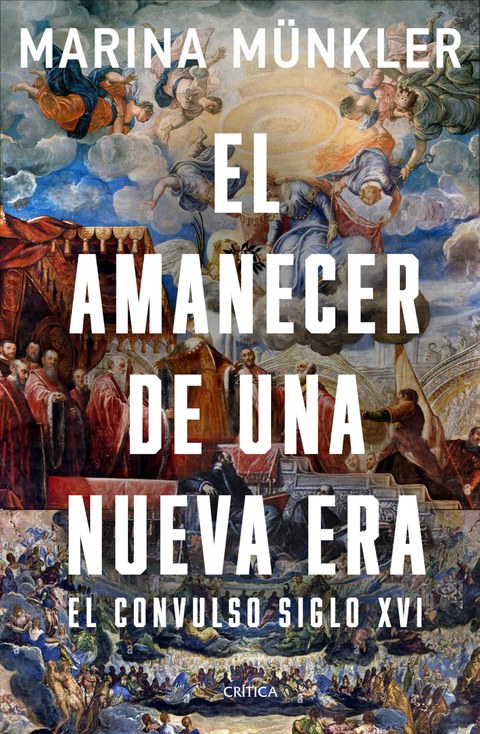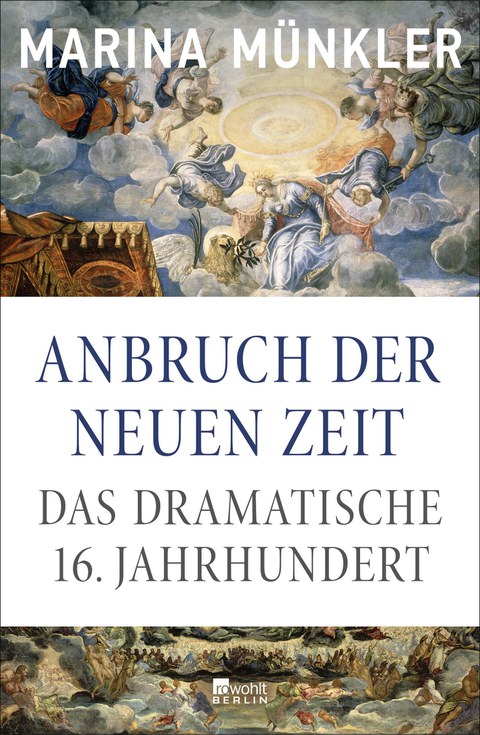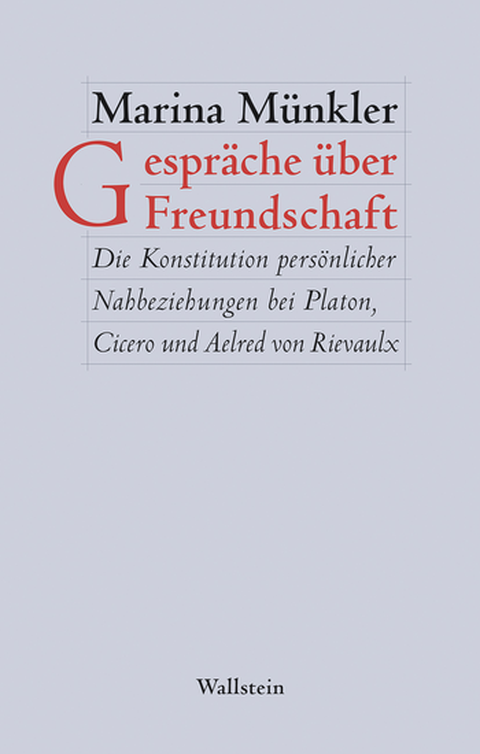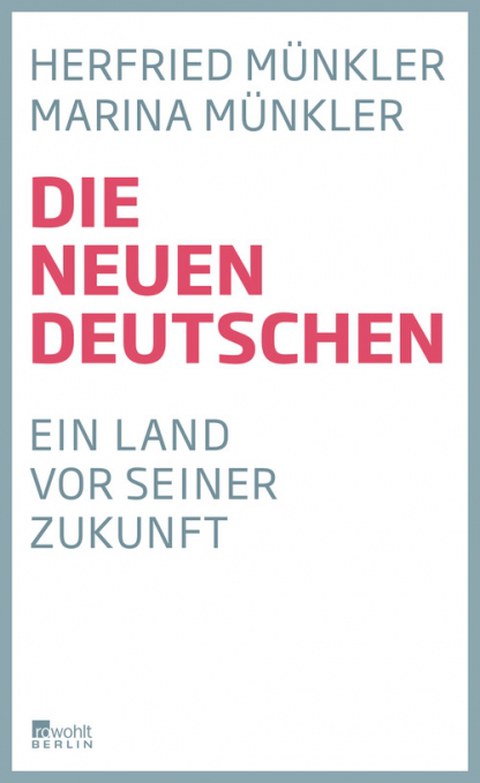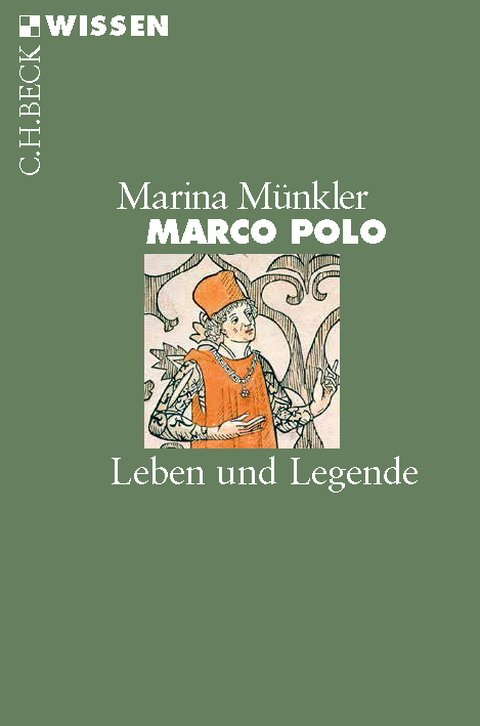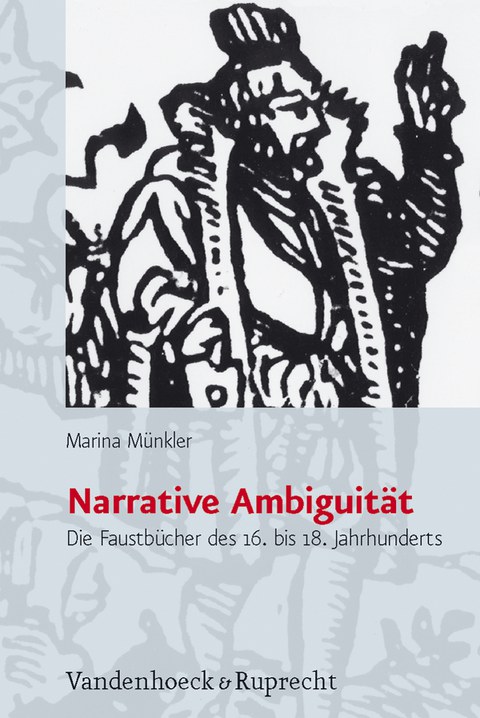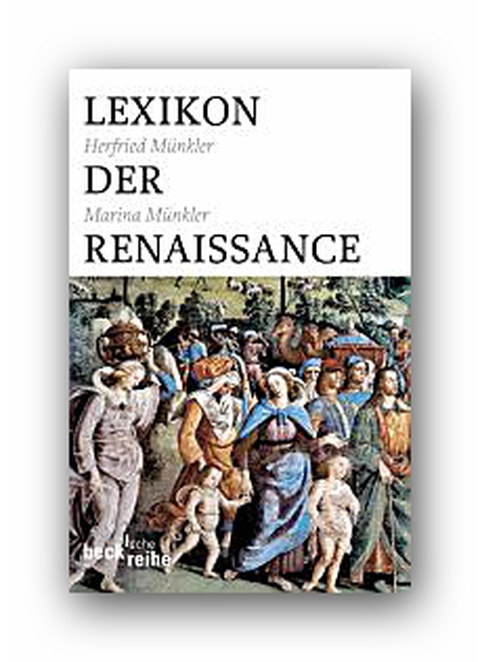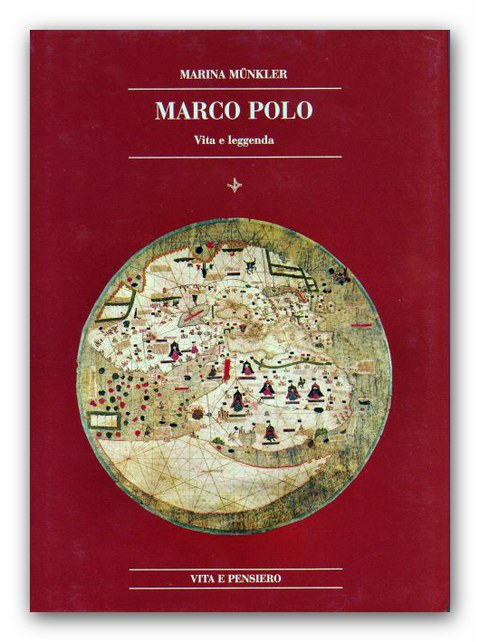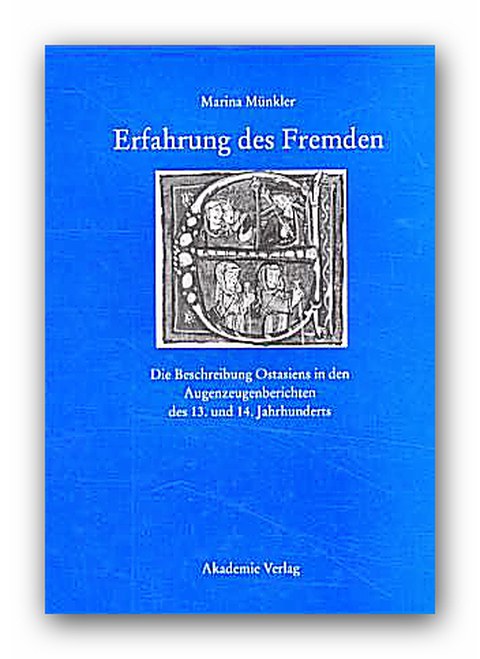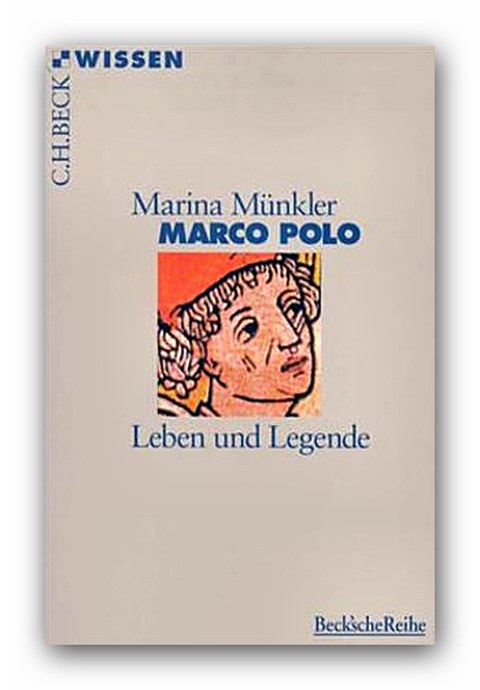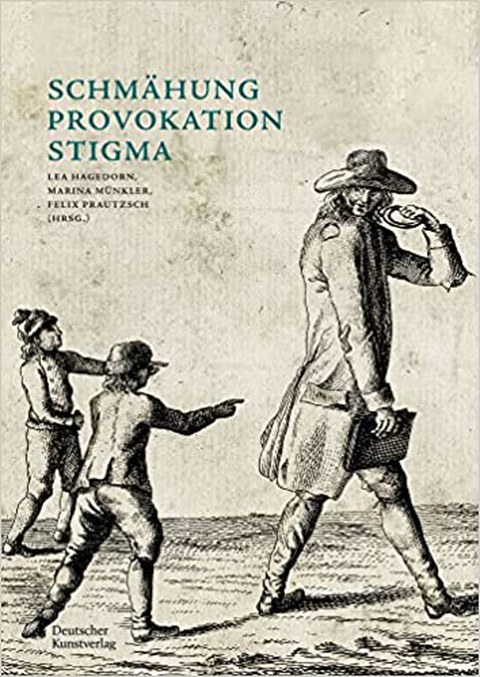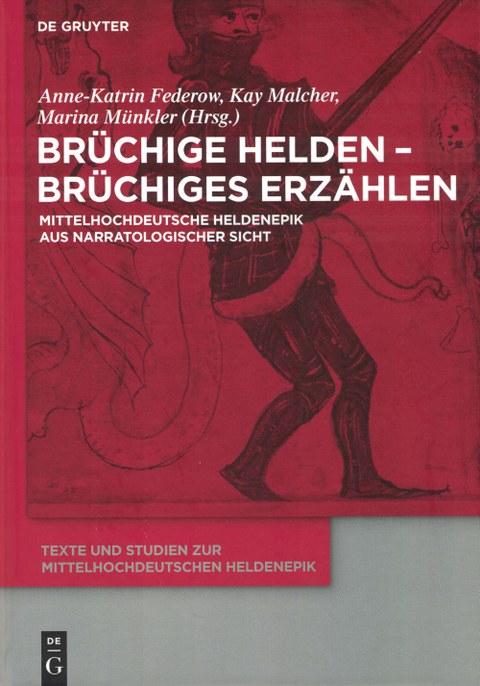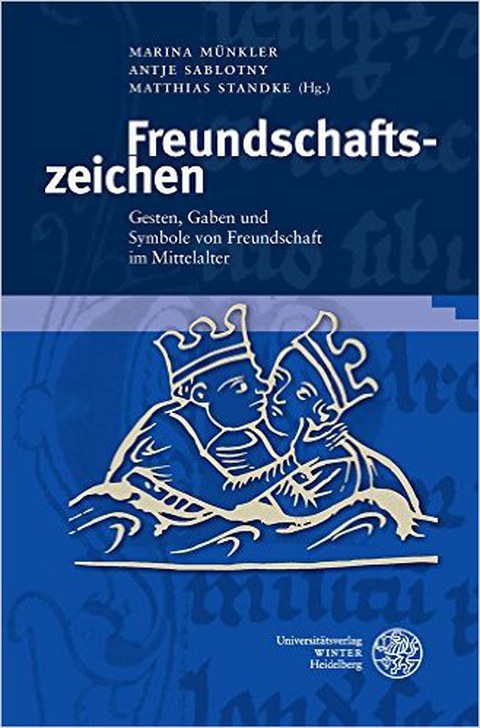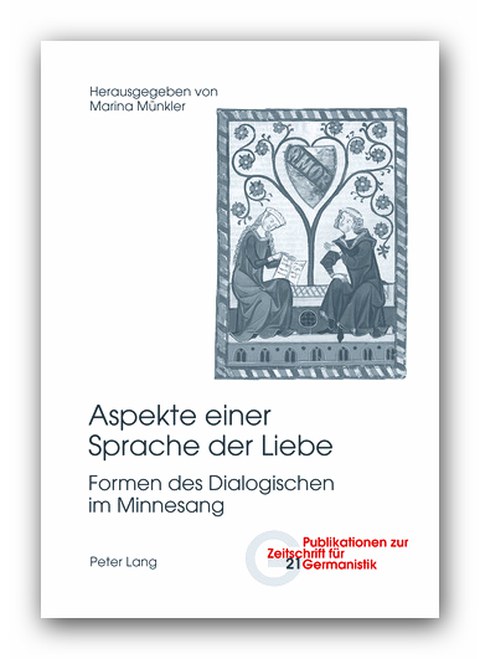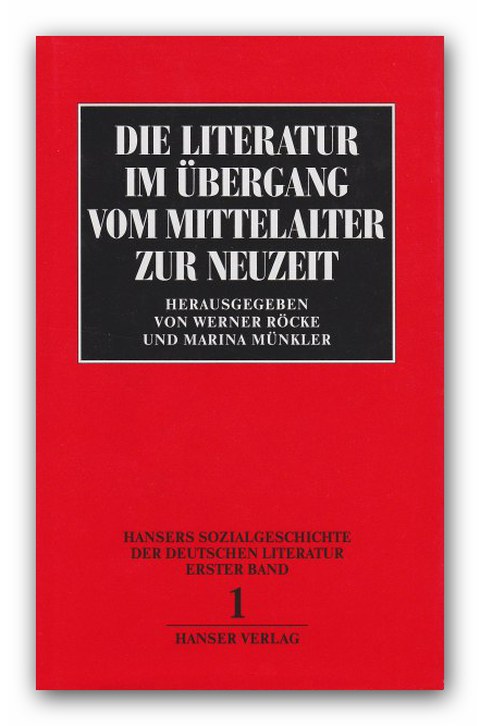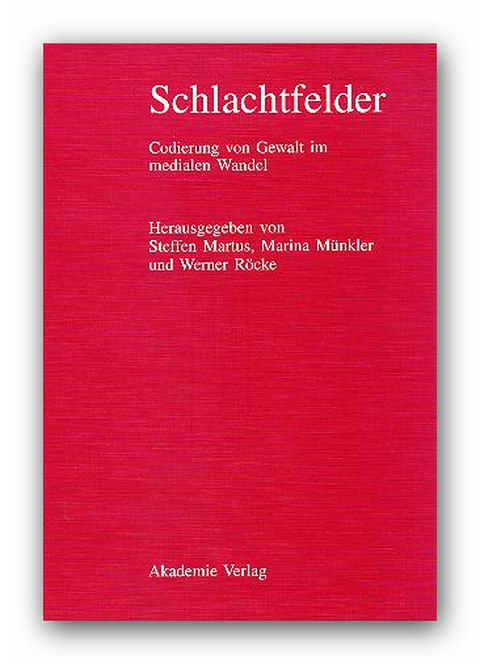Publications
Monographs
The Spanish translation of the book Anbruch der neuen Zeit was published at the end of April 2025
published on 12.03.2024 by Rowohlt Verlag Berlin
In the 16th century, the world changes from the ground up. When Christopher Columbus discovered a previously unknown part of the world in 1492, the claim to European rule over this "new" world was born; Christianity became a global religion. At the same time, the Old World was under enormous pressure from the Ottomans, who were expanding deep into Europe, and shortly afterwards its religious unity collapsed with the posting of Martin Luther's theses. Marina Münkler traces this dramatic age of discovery and conflict, telling of the "savages" of the New World and the "saints" of the Old, as well as the conflicts surrounding the "Turks". Münkler describes the media revolution of book printing and the Reformation, which completely changed the relationship of each individual not only to the church, but also to faith and the certainty of salvation, the birth of modern natural science, as well as peasant wars and witch burnings. A century that was fundamental in every respect - and which, as Marina Münkler shows, has much in common with us. A great work of history about the dawn of a new era, our era.
Reviews of the book
1st place non-fiction list April by ZDF, Deutschlandfunk Kultur and DIE ZEIT
Augsburger Allgemeine 16.3.2024
Article recommendation from the SZ app: Spiegel unserer Zeit /
New empires, deep divisions, contested trade routes: Cultural historian Marina Münkler portrays the 16th century.
https://www.sueddeutsche.de/kultur/marina-muenkler-anbruch-der-neuen-zeit-rezension-1.6522942
published on 29.06.2022 by Wallstein-Verlag
How to win a friend and how to maintain friendship - themes of philosophy since antiquity.
Since ancient philosophy, friendship has been the subject of constant reflection. How does one find a friend, how can one appear worthy of friendship to another, how does one gain and maintain friendship? The three famous friendship dialogues, Plato's "Lysis", Cicero's "Laelius de amicitia" and Aelred of Rievaulx's "De spiritali amicitia", deal with these questions at different times and in different places, but they all make friendship a philosophical subject that goes far beyond everyday questions and searches for the core of human identity. And they deal with them in dialog - the central medium of friendship.
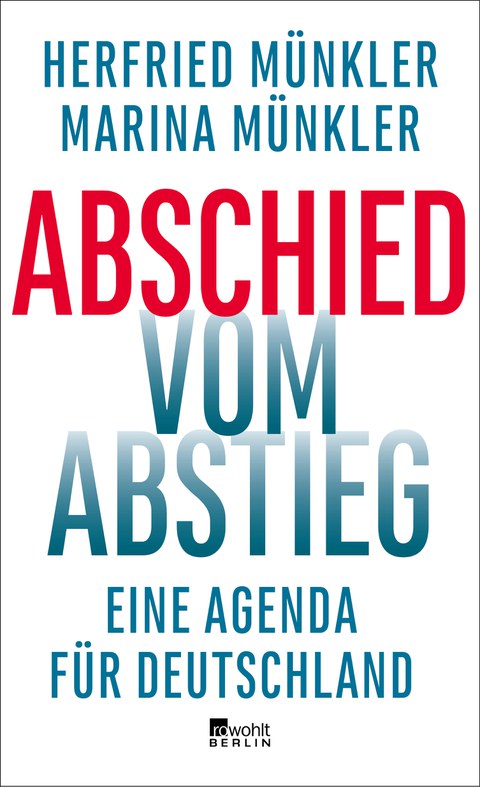
Abschied vom Abstieg
Published on 17.09.2019 by rowohlt-Verlag
Reviews of the book
Arno Widmann: "Marina and Herfried Münkler: "Abschied vom Abstieg" - Aufregung als Ersatz für Politik" in the Frankfurter Rundschau on 30.11.2019 and in the Berliner Zeitung on 01.12.2019
Review on MDR Kultur - Radio on 18.09.2019
Conversations
Interview with Gabor Steingart on 31.10.19 for the "Morning Briefing" podcast
Web version
Interviews about the book
Interview with Schwäbische Zeitung on 09.10.2019:"The Berlin academic couple Marina and Herfried Münkler make suggestions for a better policy"
Interview with Deutschlandfunk Kultur on 21.10.2019
Television interview with Bayerischer Rundfunk in the program nacht:sicht on 08.10.2019
Interview with Deutschlandfunk Kultur on 21.09.2019
Interview with the Süddeutsche Zeitung on 16.09.2019
published on 26.08.2016 by
rowohlt publishing house
Interviews about the book
- Marina Münkler in ZEIT Online on 6/10/2016 Refugee crisis
- Marina and Herfried Münkler in NRC Handelsblad on 9.9.2016 Ook de autochtone Duitser moet veranderen
- Marina and Herfried Münkler in conversation on NDR Kultur"Klassik à la carte" on 22.08.2016.
- Tagesspiegel on 28.08.2016 Causa Tagesspiegel
- FAZ interview from 30.08.2016
Reviews of the book
- Süddeutsche Zeitung on 30.8.2016: Social utopia "The new Germans" How we stay true to our values with immigration
- Family constellation. Review in Spiegel magazine no. 34 from 20.08.2016
- Tagesspiegel on 28.08.2016 Causa Tagesspiegel
- Sächsische Zeitung on 25.08.2016 End of a life lie
Marco Polo. Life and legend. 2nd revised and expanded edition. Munich: C.H. Beck, 2015.
Narrative ambiguity. The Faust books of the 16th to 18th centuries. Göttingen: Vandenhoeck and Rupprecht, 2011
(= Historical Semantics 15). (= habilitation thesis)
Review: Michael Ott, in: H-Soz-u-Kult, 24.01.2012 (HistLit 2012-1-047); Manuel Bauer, in: literaturkritik.de, No. 12, December 2012, Literaturwissenschaft; Peter Philipp Riedl, in: Beiträge zur Geschichte der deutschen Sprache und Literatur (PBB) 135 (2013), pp. 309-314.
Lexikon der Renaissance (together with Herfried Münkler). Munich: C.H. Beck, 2001 (paperback edition: Munich: C.H. Beck, 2005).
Review: Aargauer Zeitung, 24.3.2001; Panorama, 27.2.2001; Harald Müller, in: H-Soz-u-Kult, 8.3.2001; Süddeutsche Zeitung 9./10. 12. 2000; Rhein-Zeitung, 1.12.2000; Der Tagesspiegel, 5.11.2000.
Marco Polo. Vita e leggenda. Milano: Vita e Pensiero, 2001 (Italian translation of Marco Polo. Leben und Legende).
Experience of the stranger. The Description of East Asia in the Eyewitness Accounts of the 13th and 14th Centuries. Berlin: Akademie Verlag, 2000 (= dissertation)
Review: Johannes Fried, in: HZ, 276/1 (2003); Folker Reichert, in: DA 58/1 (2002); Felicitas Schmieder, in: IASL online, 13.9.2003; Dietrich Huschenbett, in: Germanistik 3/4 (2001); Dieter Rothermund, in: Periplus (2001); Gerhard Krebs, in: Das Historisch-Politische Buch 48/4 (2001); Mechthild Leutner, in: FUB (2001).
Marco Polo. Life and Legend. Munich: C.H. Beck, 1998.
Review: FAZ, 1.7.1999; Der Tagesspiegel, 25.7.1999; Franz Hermann Huberti, in: Geschichte, Politik und ihre Diadaktik H. 1-2 (1999); Jürgen Tacke, in: ID 45 (1998) and BA 12 (1998); Dieter Jeanrond, in: Der Evangelische Buchberater 1 (1991).
Editorships
Vilification - Provocation - Stigma
Lea Hagedorn, Marina Münkler, Felix Prautzsch
published on 22.3.2023
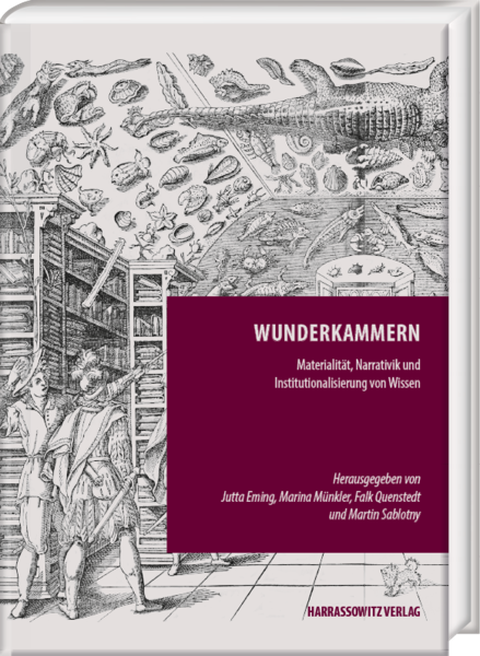
Wunderkammern
Chambers of Wonder. Materiality, narratives and the institutionalization of knowledge
editor(s):Eming, Jutta / Münkler, Marina / Quenstedt, Falk / Sablotny, Martin
series: Episteme
volume: 29
02.11.2022
ISBN: 978-3-447-11923-8
Harrasowitz Publishing House
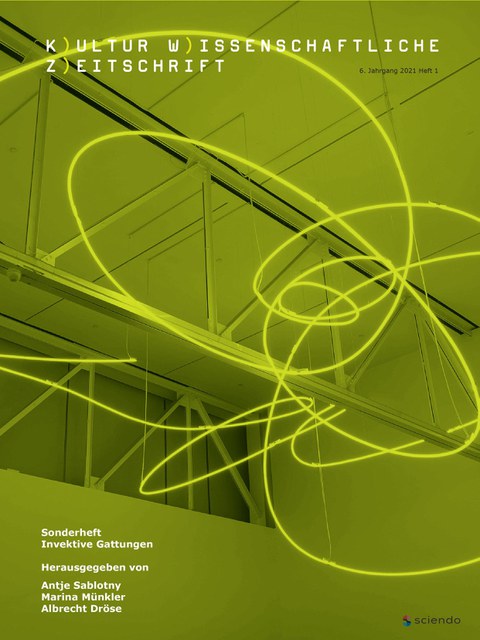
Sonderheft Invektive Gattungen
Journal of Cultural Studies / Special Issue Invective Genres
Open Access
Marina Münkler: Published Online: 31 Dec 2021
Volume & Issue: Volume 6 (2021) - Issue 1 (January 2021)
Page range: 1 - 2
DOI: https://doi.org/10.2478/kwg-2021-0028
Marina Münkler, published by SciendoThis work is licensed under the Creative Commons Attribution-NonCommercial-NoDerivatives 3.0 License.
Fragile heroes - fragile narration. Mittelhochdeutsche Heldenepik aus narratologischer Sicht (together with Anne-Katrin Federow and Kay Malcher), Berlin/Boston: De Gruyter, 2017 (Texte und Studien zur mittelhochdeutschen Heldenepik, vol. 11).
Signs of friendship. Gesten, Gaben und Zeichen von Freundschaft in der mittelalterlichen Literatur (together with Antje Sablotny and Matthias Standke), Heidelberg: Winter 2015 (Beihefte zum Euphorion, Heft 86).
Aspects of a language of love. Forms of dialog in Minnesang. Publikationen zur Zeitschrift für Germanistik 21, Bern, Berlin, Peter Lang, 2011 (Publikationen zur Zeitschrift für Germanistik 21).
Hanser's Social History of German Literature. Band 1: Die Literatur im Übergang vom Mittelalter zur Neuzeit (together with Werner Röcke). Munich: Hanser Verlag, 2004 (paperback edition Munich: dtv, 2004).
Review: Sandra Linden, in: Zeitschrift für Germanistik NF 15 (2005); Gert Hübner, in: IASL online, Dec. 7, 2004.
Battlefields. Zur Codierung von Gewalt im medialen Wandel (together with Steffen Martus and Werner Röcke). Berlin: Akademie Verlag, 2003.
Review: Steffen Bruendel, in: H-Soz-Kult, May 2004; Konrad Fuchs, in: Nassauische Annalen 115 (2004); Andrea Pühringer, in: Militär und Gesellschaft in der Frühen Neuzeit 8 (2004), pp. 207-211.
Essays and book contributions
Heiliger, zweiter Christus, frommer Mann, Sohn des Papstes und Widerchrist. Transformationen des legendarischen Erzählens von Franziskus in Mittelalter und Reformationszeit, gemeinsam mit Antje Sablotny, in: Pietas litterata 2 (2024), S. 35-75.
Von der Parteien- zur Plattformdemokratie. Verheißungen und Gefahren der digitalen Demokratie, in: APuZ (Aus Politik und Zeitgeschichte), 75. Jahrgang, 27-28/2025, S. 32-38.
Bericht zum DFG-Rundgespräch ›Germanistische Mediävistik als Literaturwissenschaft‹, gemeinsam mit Maximilian Benz, Martin Baisch, Manuel Braun, Annette Gerok-Reiter, Stephan Müller, Michael Waltenberger und Julia Weitbrecht, in: pbb 2025, 147(1), S. 38–62 (https://doi.org/10.1515/bgsl-2025-0002).
Die Türken in Wörterbüchern des 15.-17. Jahrhunderts, together with Theresa Beckert, in: Lobenstein-Reichmann, A. (ed.): International Journal of Lexicography 38 (2022), pp. 193-212(https://doi.org/10.1515/lex-2022-0020).
Wunderkammern - Materialität, Narrativik und Institutionalisierung von Wissen, together with Jutta Eming, in: Wunderkammern. Materialität, Narrativik und Institutionalisierung von Wissen, edited by Jutta Eming, Marina Münkler, Falk Quenstedt and Martin Sablotny, pp. 1-18.
The Merchant and the Missionary, in: Jakob Vogel (ed.): Europe and the World in History (European Culture and Identity since Homer, Vol. 3, London: Bloomsbury, 2022, pp. 33-36 (Chapter DOI 10.5040/9781350058569.0009)
Some basic considerations on the concept and scope of invective genres, in: Antje Sablotny, Marina Münkler, Albrecht Dröse (eds.): Invektive Gattungen, Kulturwissenschaftliche Zeitschrift, vol.6, no.1, 2021, pp. 1-9. https://doi.org/10.2478/kwg-2021-0026
Mediävistische Literaturwissenschaft als Gegenwartsanalyse, in: Jahrbuch der deutschen Schiller-Gesellschaft LXV (2021), discussion, guest editor: Lars Koch: Kommt die Literaturwissenschaft abhanden?, pp. 437-444.
Invective embodiments: Luther's metonymic body in anti-reformatory invectives, in: Uwe Israel, Jürgen Müller (eds.): Körper-Kränkungen. Der menschliche Leib als Medium der Herabsetzung, Frankfurt a. M.: Campus 2021, pp. 296-334 (also open access: https://www.campus.de/ebooks/wissenschaft/geschichte/koerper_kraenkungen-16977.html
Dialoglied - Wechsel - Botenlied, in: Beate Kellner, Susanne Reichlin, Alexander Rudolph (eds.): Handbuch Minnesang, Berlin: De Gruyter 2021, pp. 556-570. (ISBN: 978-3-11-035181-1).
Der Einbruch des Unvorhersehbaren und wie wir uns zukünftig darauf vorbereiten sollten (together with Herfried Münkler), in: Bernd Kortmann/Günther G. Schulze (eds.): Jenseits von Corona. Our World after the Pandemic - Perspectives from Science, Bielefeld: transcript, 2020, pp. 101-108.
The Merchant and the Intellectual: Marco Polo and Mattheo Ricci, in: Étienne François / Thomas Serrier (eds.): Europa. Die Gegenwart unserer Geschichte. wbg Theiss, Darmstadt 2019. 3 vols, vol. 3, pp. 54-59.
Luther's Rome. Eyewitness, invective and conversion. In: Christoph Mauntel / Volker Leppin (eds.): Transformations of Rome in the pre-modern era. Basel: Schwabe Verlag / Stuttgart: Kohlhammer, 2019, pp. 213-242.
Marco Polo et Matteo Ricci. Translated into French by Corinna Gepner, in: EUROPA. Notre Histoire, ed. de Etienne François et Thomas Serrier, Paris: Les Arènes 2017, pp. 987-991.
(together with Anne-Katrin Federow and Kay Malcher) Narratologie und das Erzählen der mittelhochdeutschen Heldenepik. An introduction with an orienting intention, in: Fragile Heroes - Fragile Narration. Mittelhochdeutsche Heldenepik aus narratologischer Sicht, ed. by Anne-Katrin Federow, Kay Malcher and Marina Münkler, Berlin/Boston: De Gruyter, 2017 (Texte und Studien zur mittelhochdeutschen Heldenepik, vol. 11), pp. 1-20.
Transformations of friendship semantics in discourses and literary genres since the Middle Ages, In: Handbuch Sprache in der Literatur. Edited by Anne Betten, Ulla Fix, Berbeli Wanning. Berlin/Boston: De Gruyter, 2017, pp 55-93.
Le marchand et le missionnaire: Marco Polo et Matteo Ricci. Translated into French by Corinna Gepner, in: EUROPA. Les lieux de mémoire européens, ed. by Etienne François et al., Paris: Les Arènes, 2017, pp. 987-991 (translation into German 2019 and into English 2021).
together with Dagmar Ellerbrock, Lars Koch, Sabine Müller-Mall, Joachim Scharloth, Dominik Schrage, Gerd Schwerhoff): Invectivity - Perspectives of a new research program in the cultural and social sciences, in: Kulturwissenschaftliche Zeitschrift - 1/2017, pp. 2-24.
Narrative Ambiguity: Semantic Transformations, the Voice of the Narrator and the Perspectives of the Characters. With some explanations using the example of D. Johann Fausten's Historia. In: Ambiguity. Forms of Contemporary Reflection and Scholarly Reception. Edited by Oliver Auge, Christiane Witthöft. Berlin: De Guyter 2016, pp. 113-156.
Epistemic figurations. Reflections on the status of magicians and alchemists in the knowledge order of the early modern period, In: Magia daemoniaca, magia naturalis, zouber. Ways of writing magic and alchemy in the Middle Ages and early modern period. Edited by Peter-André Alt, Jutta Eming, Tilo Renz and Volkhard Wels. Wiesbaden: Harrassowitz, 2015, pp. 205-233.
L'amicizia come concetto d'individuazione in Aelredo di Rievaulx. In: Responsabilità e creatività. Alla ricerca di un uomo nuovo (secoli XI-XIII), Atti del Convegno Internazionale (Brescia 12-14 settembre 2013), ed. by Giancarlo Andenna and Elisabetta Filippini, Milan: Vita e Pensiero, 2015, pp. 153-166 (= Le Settimane internazionali delle Mendola, 4).
Legend/lie. The Protestant polemic against the Catholic legend and Luther's lie of St. John Chrysostom, In: Godlessness and obstinacy. Religious deviance in the confessional age. Edited by Gerd Schwerhoff, Eric Piltz. Berlin 2015, pp. 121-147 (= Supplement to the Journal of Historical Research, 51).
[together with Matthias Standke]: Freundschaftszeichen. Einige systematische Überlegungen zu Gesten, Gaben und Symbolen von Freundschaft, In: Gesten, Gaben und Zeichen von Freundschaft in der mittelalterlichen Literatur. Edited by Marina Münkler, Antje Sablotny, Matthias Standke. Heidelberg: Universitätsverlag Winter 2015, pp. 9-32 (= Beihefte zum Euphorion, Heft 86).
Idoneity and Genealogy in Wolfram's Parzival, In: Idoneity - Genealogy - Legitimation. Justification and acceptance of dynastic rule in the Middle Ages. Edited by Gert Melville, Cristina Andenna. Cologne, Weimar, Vienna: Böhlau Verlag 2015, pp. 99-124.
Friendship as a symbolically generalized medium of communication, In: Freundschaft. The book. Edited for the German Hygiene Museum by Daniel Tyradellis, Berlin: Verlag Matthes & Seitz, 2015, pp. 78-87.
Amicus Dei. Forms of construction of the sacred using the example of the legends of St. Francis. In: Transcendence and the constitution of orders. Edited by Hans Vorländer. Berlin, New York 2013, pp. 374-394.
Semantic coherence, narrative incoherence. On the problem of textual structures and narrative forms using the example of the Faust books. In: Erzählen und Episteme: Literaturgeschichte des späten 16. Jahrhunderts. Edited by Beate Kellner, Jan-Dirk Müller, Peter Strohschneider. Berlin, New York 2011, pp. 91-123.
Aspects of a language of love. Minne as a medium of communication in the dialog songs of the Minnesang, In: Aspekte einer Sprache der Liebe. Forms of dialog in minnesong. Edited by ders. Bern, Berlin et al. 2011, pp. 77-104 (= Publikationen zur Zeitschrift für Germanistik 21).
Aspects of a language of love. Forms of dialog in Minnesang. In: Aspects of a language of love. Forms of the dialogical in Minnesang. Edited by ders. Bern, Berlin et al. 2011, pp. 9-15 (= Publication for the Journal of German Studies 21)
The words and the strangers. The monstrous peoples and their readings in the Middle Ages. In: Hybrid Cultures in Medieval Europe: Lectures and Workshops of an International Spring School. Edited by Michael Borgolte, Juliane Schiel, Bernd Schneidmüller, Anette Seitz. Berlin: Akademie Verlag 2010, pp. 27-50.
Curiositas as a problem of the demarcation of immanence and transcendence in the Historia of D. Johann Fausten. In: Curiosity and taboo. Rules and myths of knowledge. Edited by Martin Baisch, Elke Koch. Freiburg 2010 (= Rombach Scenae).
Penance and penitential help. Models of asceticism in Wolfram von Eschenbach's Parzival. In: Deutsche Vierteljahrsschrift für Literaturwissenschaft und Geistesgeschichte 86,2 (2010), pp. 131-159.
"durch unverdrossene tüchtige Arbeit": Karl Lachmann (1793-1851) als Philologe, in: Zeitschrift für Germanistik, Neue Folge XX, 1 (2010), pp. 104-122.
Sinfulness as a generator of individuality. On the transformations of legendary narratives in the Faust books of the 16th and 17th centuries. In: Literary and Religious Communication in the Middle Ages and Early Modern Times. DFG Symposium 2006, ed. by Peter Strohschneider Berlin/New York 2008, pp. 25-61 (Germanistische Symposien. Berichtsbände).
Melancholy and Despair: The Historia of D. Johann Fausten. In: (ed.): Melancholy - between Attitude and Discourse. Concepts, in the Middle Ages and Early Modern Times. Edited by Andrea Sieber, Antje Wittstock. Göttingen 2008 (V&Runipress), pp. 75-93.
Stagings of norm reflexivity and self-reflexivity in Wolfram von Eschenbach's Parzival. In: Journal of German Studies NF XVIII, 3 (2008), pp. 497-511.
Performative readings: Historia by D. Johann Fausten (1587). In: Literary Performativity. Readings of pre-modern texts. Edited by Cornelia Herberichs, Christian Kiening. Zurich. Chronos, 2008, pp. 354-371 (= Medienwandel - Medienwechsel - Medienwissen 3).
Monstra and mappae mundi: the monstrous peoples of the edge of the earth on medieval world maps. In: Text - Image - Map. Cartographies of the pre-modern era. Edited by Jürg Glauser and Christian Kiening, Freiburg: Rombach Verlag, 2007, pp. 149-173.
The monstra in Konrad von Megenberg's "Book of Nature". In: Konrad von Megenberg (1309-1374) and his work. The knowledge of the time. Edited by Claudia Märtel, Gisela Drossbach and Martin Kitzinger, Munich: C.H. Beck, 2006, pp. 229-250 (=Beihefte der Zeitschrift für Bayrische Landesgeschichte 31, Reihe B).
"always called the speculator". Curiositas as an identitary characteristic in the Faust books of the 16th and 17th centuries. In: Faust-Jahrbuch 2 (2005/2006), pp. 61-81.
Traveling, perceiving, remembering. Some prerequisites for the constitution of experience in the "Historia Mongalorum" by Johannes de Plano Carpini. In: Memoria. Ricordare e dimenticare nella cultura del medioevo = Memoria. Remembering and forgetting in the culture of the Middle Ages. Atti dell' convegno tenuto a Trento nei giorni 4-6 aprile 2002, a cura di/hrsg. von Michael Borgolte - Cosimo Damiano Fonseca - Hubert Houben, Bologna: Il mulino, Berlin: Duncker & Humblot, 2005, pp. 77-98 (= Annali dell'Istituto storico italico-germanico in Trento. Contributi 15 / Yearbook of the Italian-German Historical Institute in Trento. Contributions 15).
Fear of hell and torment of conscience. Reasons and abysses of self-care in the "Historia von D. Johann Fausten". In: Journal of German Studies, NF XIV, 2 (2004), pp. 249-264.
Ubi Melancholicus - Ibi Diabolus. The "Historia of D. Johann Fausten". In: Humboldt-Spektrum, 11, 2 (2004), pp. 30-35.
Review: Josef Tutsch: Die Krankheit zur ewigen Verdammnis. Das Volksbuch vom Doktor Faustus - eine Beschreibung der Melancholie, in: http:/www.scienz.com/magazin/content58-783.html
Fear of hell and torment of conscience. Reasons and abysses of self-care in the "Historia von D. Johann Fausten". In: Journal of German Studies, NF XIV (2004), pp. 249-264.
Introduction to: Hanser's Social History of German Literature. Volume 1: The literature of the 15th and 16th centuries. Edited by Werner Röcke and Marina Münkler, München: Hanser Verlag, 2004, pp. 9-20.
Early and high humanism in the vernacular. In: Hanser's Social History of German Literature. Volume 1: The literature of the 15th and 16th centuries. Edited by Werner Röcke and Marina Münkler, Munich: Hanser Verlag, 2004, pp. 77-96.
Battlefields. Codierung militärischer Gewalt im medialen Wandel (together with Steffen Martus and Werner Röcke). In: Battlefields. On the coding of violence in medial change. Edited by Steffen Martus, Marina Münkler, Werner Röcke. Berlin: Akademie Verlag, Berlin 2003, pp. 1-17.
Interculturality and Alterity: Older German Literature. In: German Studies as Cultural Studies. An introduction to new theoretical concepts. Edited by Claudia Benthien and Hans Rudolf Velten, Reinbek b. Hamburg: rororo, 2002, pp. 323-344.
The explorer and conqueror. In: Border violators. Of smugglers, spies and other subversive figures. Edited by Eva Horn, Stefan Kaufmann and Ulrich Bröckling, Berlin: Kulturverlag Kadmos, 2002, pp. 156-175.
Experiencing Strangeness: Monstrous Races on the Edge of the Earth as Depicted on Medieval Maps. In: The Medieval History Journal 5, 2 (2002), pp. 195-222.
The ordo idea and the hermeneutics of the foreign in the Middle Ages. The confrontation with the monstrous peoples of the edge of the earth (together with Werner Röcke). In: The challenge of the foreign. Edited by Herfried Münkler with the collaboration of Karin Meßlinger and Bernd Ladwig, Berlin: Akademie Verlag 1998, pp. 701-766.
Smaller contributions and interviews
And yet: We can do it. Five years after Angela Merkel's famous sentence. A political explanation of the term, in: Der Hauptstadtbrief 05/09/2020 [https://www.derhauptstadtbrief.de/und-doch-wir-koennen-das-schaffen/]
Charles V and the Europe of our time (together with Herfried Münkler), in: Max Joseph No. 2: Constitution, 2018/19, pp. 31-34.
The logic of disparagement, in: Die Bühne 9/2019, pp. 24-30.
The new Germans. Vom Deutschsein und Deutschwerden - wie die Herausforderung des Flüchtlingsstroms zu einer Win-win-Konstellation werden kann (together with Herfried Münkler), in: DE Magazin Deutschland 3/2017, pp. 46-51 (translation into English, French, Italian, Spanish and Russian].
The new Germans. Die gesellschaftliche Integration von Migranten (together with Herfried Münkler), in: Politik und Kultur 2/2017, pp. 1-2.
"What was the punishment for now?" Interview with the literary scholar Marina Münkler about miracles, saints and heretics, In: DER SPIEGEL. History: People in the Middle Ages: Rulers, heretics, minstrels 1 (2015), p. 54-57.
The Holy Scriptures: Reading forbidden, In: ZEIT Geschichte 3 (2014): The Church and its heretics, pp. 56-57.
Encyclopedia article
John Mandeville; Marco Polo; Faust, Mephisto; Priest King John. All in: Figures of the Middle Ages in Poetry, Music and Art. An encyclopedia of historical and literary figures. Edited by Horst Brunner and Mathias Herweg, Stuttgart: Alfred Kröner Verlag 2007.
Georg Rudolff Widman, in: Early Modern Period in Germany 1520-1620. Literary Dictionary of Authors (VL 16), ed. by Wilhelm Kühlemann, Jan-Dirk Müller et al., vol. 6, Berlin/Boston 2017 pp. 552-55.

